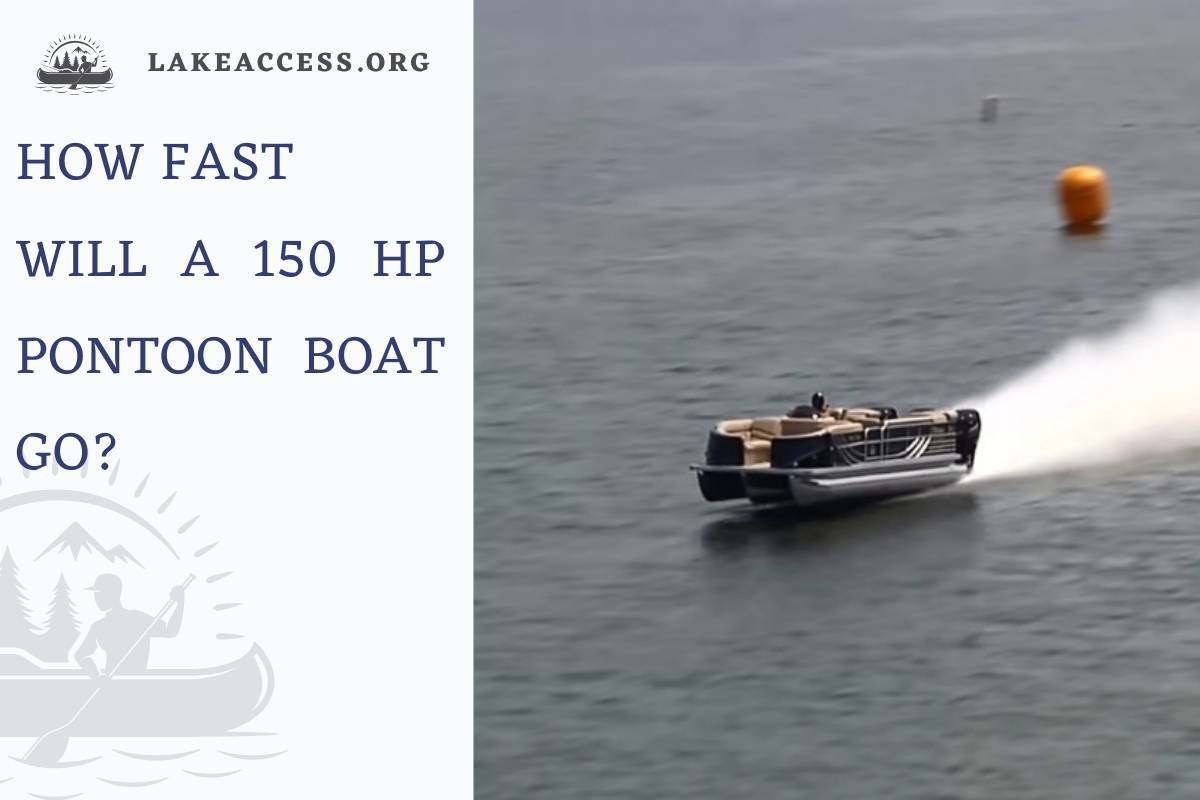If speed matters to you, understanding how fast a 150 HP pontoon boat can go is important. Typically, a pontoon boat with a 150 HP engine can reach speeds ranging between 25-30 miles per hour, under standard conditions. However, this speed range hinges on factors like the boat’s weight, propeller pitch, and the number of people onboard.
That said, a lighter pontoon boat with a 150 HP engine, when fewer people are onboard, can reach up to 35 miles per hour. Towing activities or rough weather conditions might decelerate the speed. In essence, with a 150 HP engine, your pontoon boat can offer a great blend of speed and stability, excellent for family outings, fishing trips, or relaxed cruising around the waterways. It’s essential to manage your expectations and utility from the boat based on the engine’s horsepower and the aforementioned influential factors.
Speed of a 24 Ft Pontoon with a 150 HP Engine
A 24 ft pontoon boat equipped with a 150 HP engine is a typical setup that blends size and power quite harmoniously. On this type of platform, you can expect an average maximum speed of about 30 to 35 miles per hour under favorable conditions. This estimation, as always, is influenced by the boat’s load, the water conditions, and the propeller’s size and pitch.
Although ideal for leisurely cruising or recreational fishing trips, a 150 HP engine on a 24 ft pontoon can give the thrill of speed when needed. Especially when the boat is lightly loaded and in calm water conditions, you might find that it can push slightly past the 35 mph mark. However, remember that pontoon boats are primarily designed for comfort and stability, not speed, so adjusting expectations to match this will ensure a pleasing boating experience.
How Fast Does a Pontoon Boat Go?
A common question on the minds of potential pontoon boat owners is, “Just how fast can a pontoon boat go?” and the answer isn’t as straightforward as it might seem. The speed of a pontoon boat relies on a variety of factors, from the size of the boat and its motor to the number of people on board and even the current water conditions.
Typically, your average pontoon boat runs at a speed of about 15 to 30 miles per hour. But hold on there, don’t get it wrong— some high-performance models can reach speeds up to 60 mph! A speedier pontoon appeals to those who enjoy towing water skiers or just revel in the thrill of cutting through the water at high velocity. These pontoon boats usually come equipped with larger engines capable of handling the demand for higher speeds.
However, the quintessential charm of a pontoon boat isn’t about its speed but the laid-back, leisurely cruising experience it provides. Pontoons are designed for stability and compromise on speed to offer a smoother ride. For most pontoon sailors, the delight is in the journey rather than the rush of getting to the destination. So, while considering the speed of a pontoon boat, first consider how you intend to use it since it is a vessel built more for comfort and leisurely jaunts than winning any boat races, yet it has the ability to surge when needed. Enjoy the ride at the pace that suits you best!
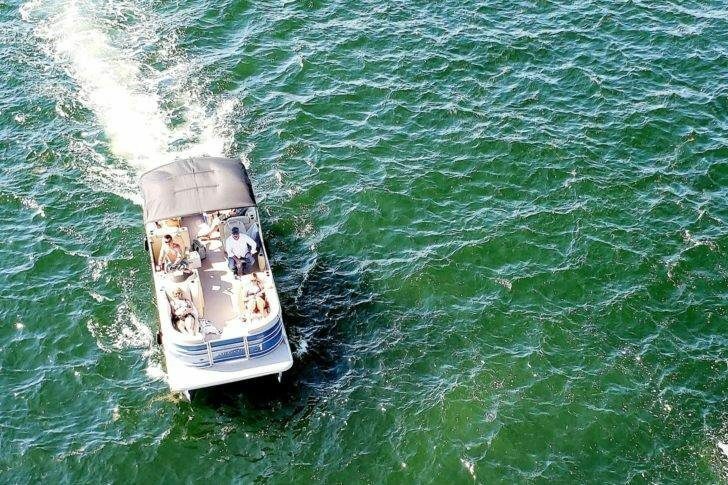
Types of Pontoon Boats and Their Different Speeds
Fishing Pontoons
A pontoon boat is a type of boat that has pontoons instead of a hull. This makes the boat very stable on the water and perfect for fishing trips, as it will not rock back and forth as traditional boats do. A more modern version of the pontoon boat is faster than older versions due to technological advances. There are three basic pontoon boats: Catamaran, Trimaran, and Triton boats.
Pontoon boats can provide a lot of versatility- they can be used for watersports, small vessel ferries, wakeboarding activities, and fishing trips. They come at various speeds, depending on the buyer’s desired type of boat. Pontoon boats are typically made of PVC and nylon, making them lightweight and easy to transport. However, they can quickly capsize when capsized in windy or wavy conditions, so caution should always be taken while out on the water.
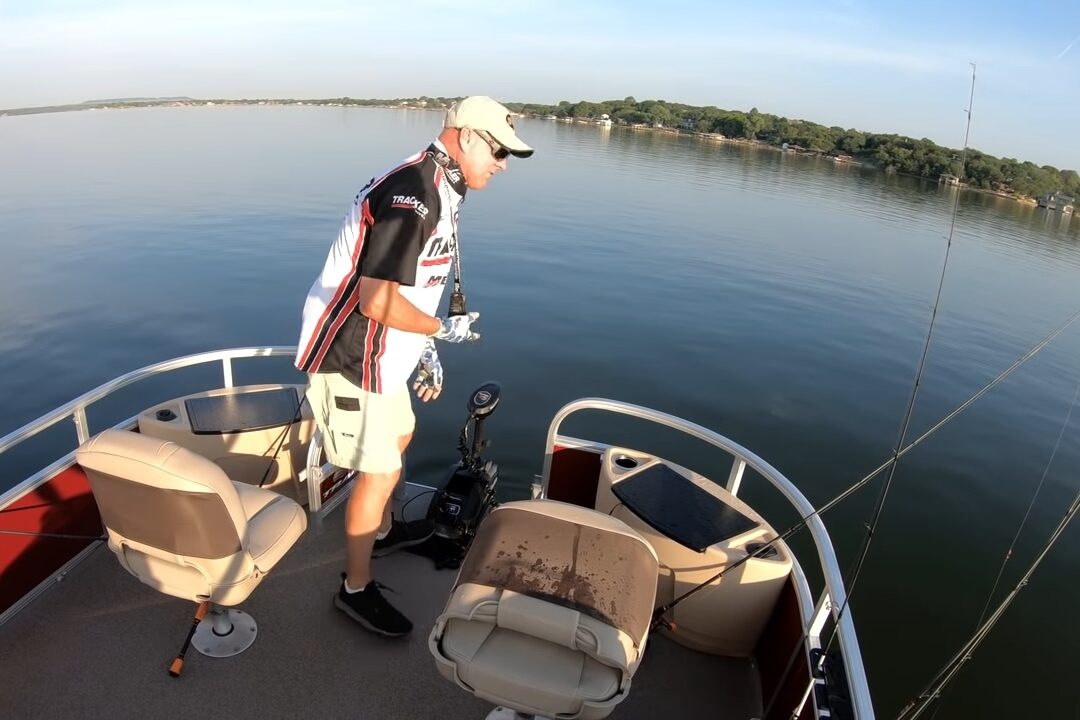
Performance Pontoons
Performance pontoons are becoming increasingly popular as people discover their speed and agility on the water. With a V-shaped hull, these boats can reach planning speed faster than a traditional pontoon boat. In addition, the middle pontoon is designed so that it doesn’t sink as low as the other two, which makes for a better ride and less drag on the water.
A few modifications can also help because pontoons are not meant for speed. PlayCraft is the first company to develop pontoons into speed machines, and they continue to lead the industry with their Powertoon X-Treme 3110 model. This boat has twin Mercury Racing outboards that push it to speeds up to 60 mph. The Pontoon Boat has twin 400-hp Mercury outboards, making it one of the most powerful on the market. These boats are designed to be fast and comfortable, even when anchored or on the water, relaxing in the “comfort of many couches.”
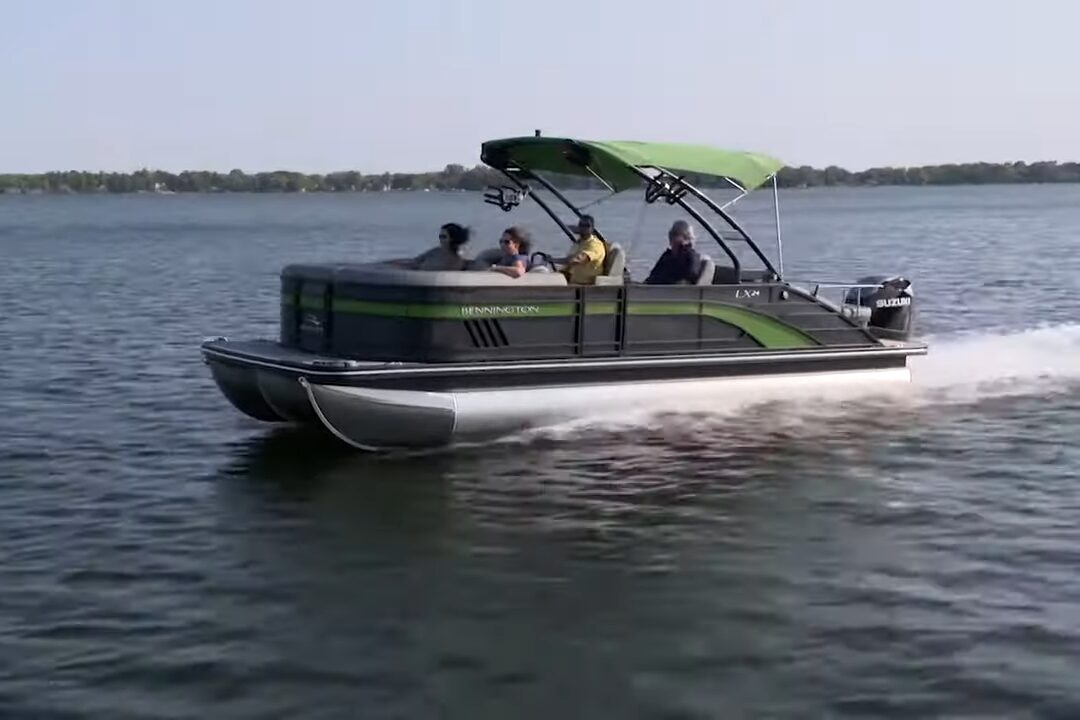
Luxury Pontoons
Luxury pontoon boats have a lot of features that make them perfect for lounging or swimming. They often come with bars, couches, and TVs. These Pontoons are not meant to be very fast but instead slow and enjoyable.
They are also capable of traveling at speeds around 20 miles per hour. This is more than enough to get you where you need to go without worrying about being left behind. In addition, pontoon boats are typically powered by 300-horsepower engines. This means that they can easily cover large distances in a short period.
Luxury Pontoon boats are also very stable. Since they have multiple pontoons, there is less risk of tipping over when you’re on the water. This means you can travel at high speeds without worrying about being thrown overboard.
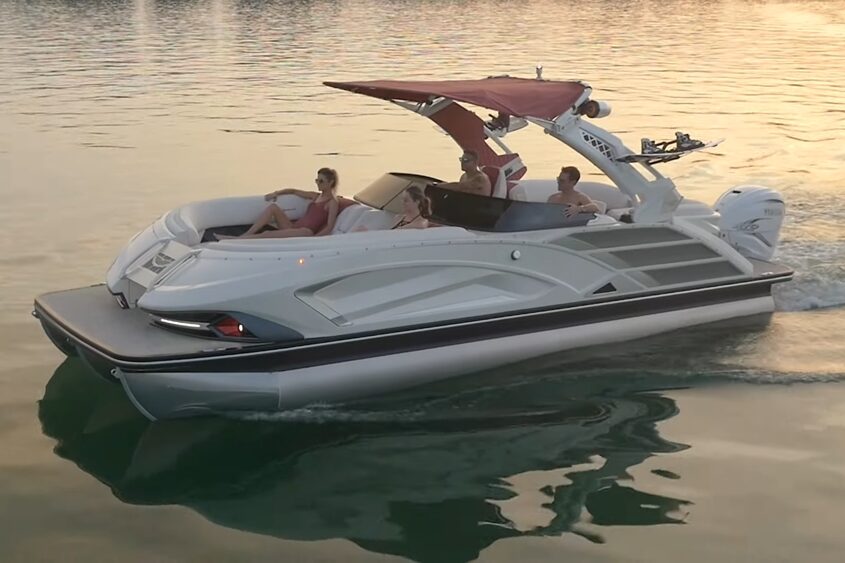
Different Speeds of various pontoon boat models
If you’re in the market for a pontoon boat, you might be wondering about the different speeds available with different models. While the speed of a pontoon boat can depend on several factors, including engine size, weight, and water conditions, we’ve compiled a list of some popular pontoon boat models and their estimated speed range. Check out the table below for more information on speed and fuel consumption for each model, along with the size and horsepower range. Please keep in mind that these figures are only estimates, and actual speeds and fuel consumption may vary depending on several factors. Always consult the manufacturer’s guidelines and operate your boat safely and responsibly.
| Pontoon Model | Size | Horse Power | Max Speed | Fuel Consumption |
| Bass Buggy | 16 feet | 40 | 15 mph | 4 GPH |
| Bennington SX | 22-28 feet | 115-200 | 25-35 mph | 6-12 GPH |
| Harris Cruiser | 20-26 feet | 90-200 | 20-30 mph | 6-12 GPH |
| Sweetwater | 24 feet | 90 | 18 mph | 8 GPH |
| Sun tracker | 18 feet | 60 | 21 mph | 9.10 GPH |
| Gigantic | 30 feet | 115 | 21 mph | 10.5 GPH |
| Starcraft | 20 feet | 70 | 23 mph | 8 GPH |
| Party Barge | 18 feet | 75 | 24 mph | 9.5 GPH |
| Bennington | 24 feet | 150 | 25 mph | 15 GPH |
| Lowe | 24 feet | 300 | 50 mph | 26.2 GPH |
Factors That Can Affect A Pontoon Boat’s Speed
Pontoon boat speed hinges on several determinants such as engine type, weight, propeller size and pitch, and regular maintenance.
First, engine type heavily influences speed. Primarily, pontoon boats feature inboard and outboard engines. The strength lies with inboard engines that offer more power and therefore, greater speed. However, they demand substantial maintenance, space, and expenses. Conversely, outboard engines are more fuel-efficient, convenient to upkeep, and space-saving but generally hold lower power output, reducing speed. The engine’s horsepower and torque directly impact the speed as well. Your choice should depend on your intended usage and budget.
The weight of the boat, passengers, and cargo is another major speed influencer. Overloading the boat can drop speed as it calls for more power to propel the added weight. Maintain balance by evenly distributing weight across the boat and adhering to the manufacturer’s weight capacity recommendation for optimal speed.
Next, propeller size and pitch are critical to speed dynamics. Bigger propellers with higher pitch promise more power, thereby augmenting speed. The blade quantity also counts. Fewer blades provide greater speed whereas more blades assure better stability and maneuverability. Select a suitable propeller considering your boat and engine specifics.
Finally, routine maintenance is necessary to ensure consistent speed. Regular cleaning, oil checks and changes, inspecting propellers for damage, ensuring proper functioning of the fuel system, and battery tests ensure the performance and longevity of your pontoon.

Tips to Make Your Pontoon Boat Go Faster
Boosting the speed of your pontoon boat requires detail-oriented enhancements, a perfect blend of engine power, weight distribution, and design adaptations.
First off, consider your engine’s capacity – the heart of your vessel. A more robust engine guarantees comprehensive speed, making a notable difference. For instance, a 500HP will outperform a 20HP engine, significantly impacting your boat’s pace. However, it’s vital to note that larger engines directly affect your pontoon’s price.
Next, your boat propeller plays a paramount role. A larger prop results in increased thrust, pushing more water to accelerate your assembled speed. Opt for a prop made of sturdy materials such as stainless steel for optimum outcomes.
Lifting the strakes, the fin-like components of the boat, and elevating the pontoon’s front can also contribute to enhanced speed. This process decreases resistance against the water flow, allowing your boat to cut through the water more efficiently.
Weight distribution constitutes another essential factor. Placing heavier components towards the boat’s rear can advance the speed due to the resulting drag and lift. Consider adding ballast tanks, which can be filled with sand or water, to improve your pontoon’s speed.
Also, reducing drag is crucial for speed improvement. By adding thin, smooth metal sheets at your pontoon’s bottom, you can lessen drag and speed up your boat, making your rides smooth and swift.
For those who desire more speed, consider transforming into a Tritoon by adding a central aluminum tube, making your pontoon cruise more efficiently at high speeds. It’s recommended for boats over 115 HP or longer than 22 feet, but expert advice should be sought before any major upgrades.
Lastly, consider sailing conditions. Traveling with wind assistance can enhance your pontoon’s speed. Be mindful of wind resistance elements like a bimini that could potentially slow you down, even though they offer other benefits like shade.
Remember, each speed modification should align with your pontoon’s specifications and usage purposes for optimum results.
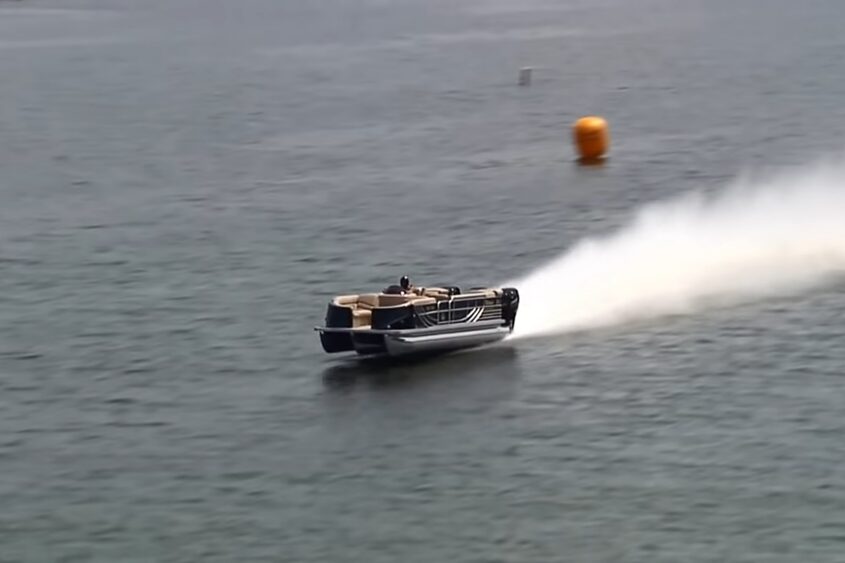
FAQs
What is the boat’s horsepower?
The horsepower of a boat is the engine’s ability to generate power. Boats with high horsepower engines can move faster than those with low horsepower engines. However, the horsepower of a boat is not directly related to how fast it can go because other factors are also involved in speed.
How fast will a 24-foot pontoon boat go?
A 24-foot pontoon boat with a 150 HP engine can travel at a speed of approximately 20 miles per hour. This is the maximum speed that can be achieved on flat water. If you are traveling in choppy or rough water, the maximum speed will be reduced to 15 miles per hour.
How fast does a 50-hp pontoon boat go?
On average, a 50-hp pontoon boat can reach a top speed of around 20 to 25 miles per hour (32 to 40 kilometers per hour). However, this can vary depending on the specific boat and engine.

